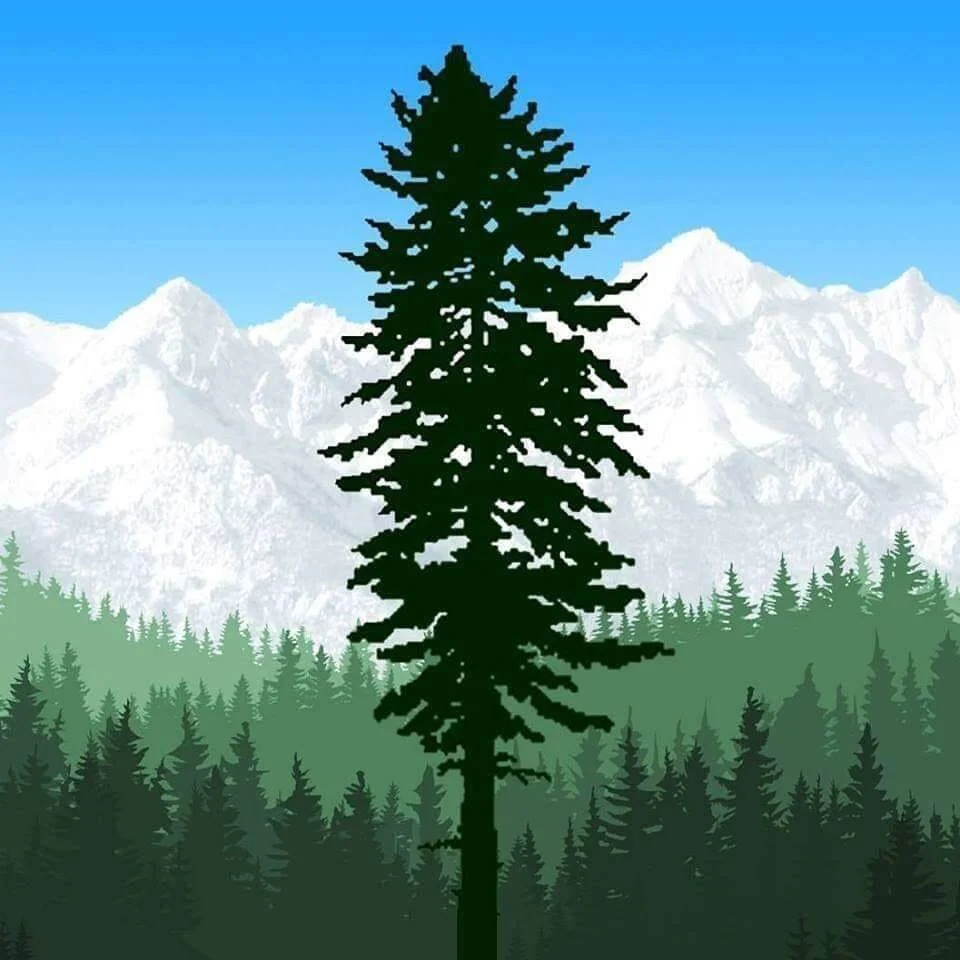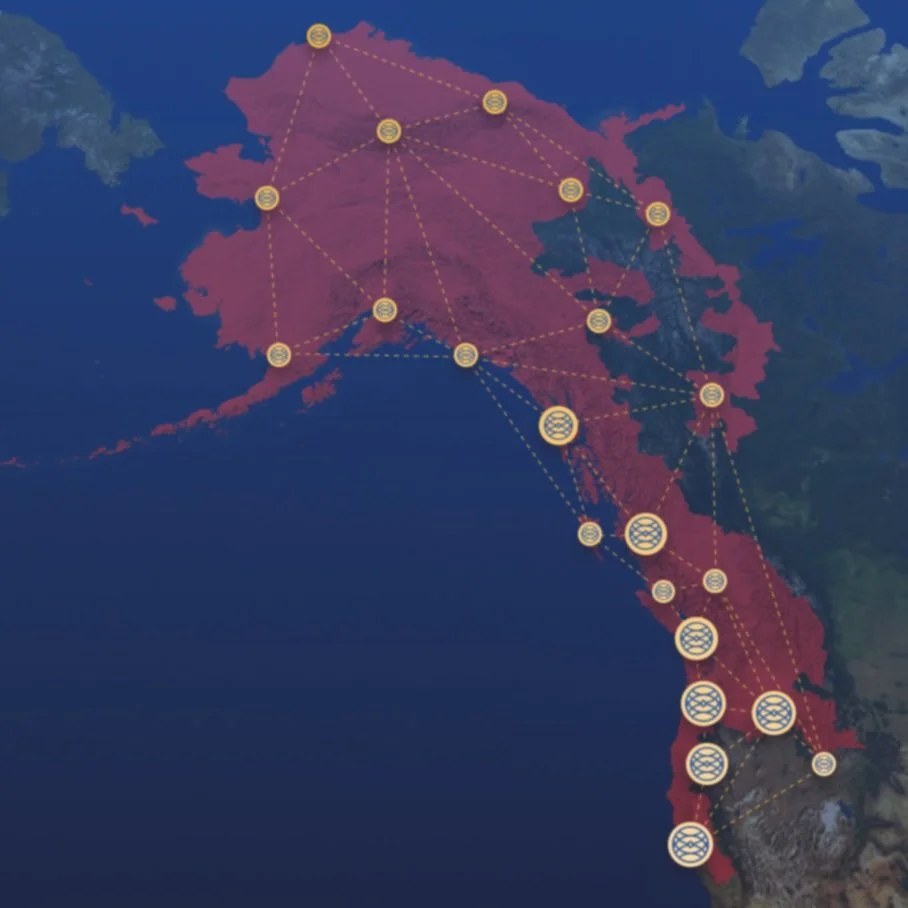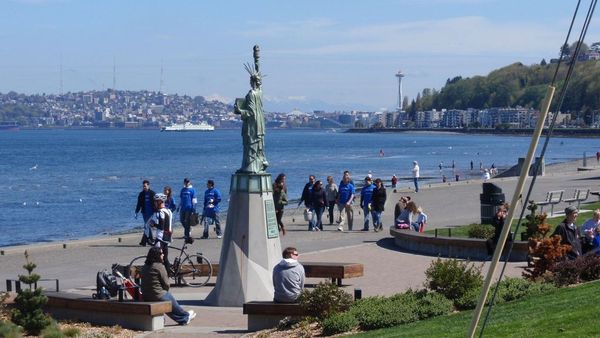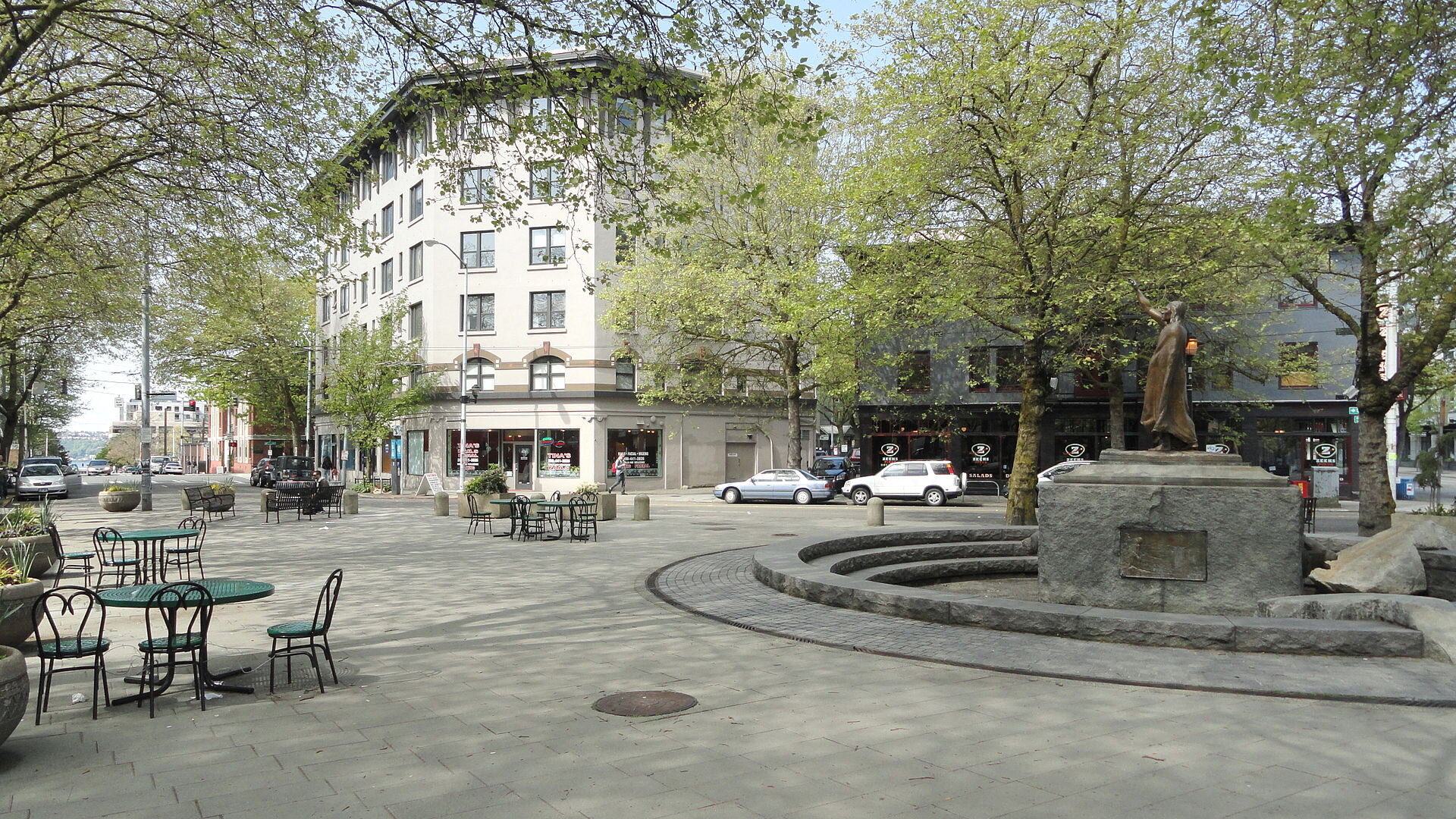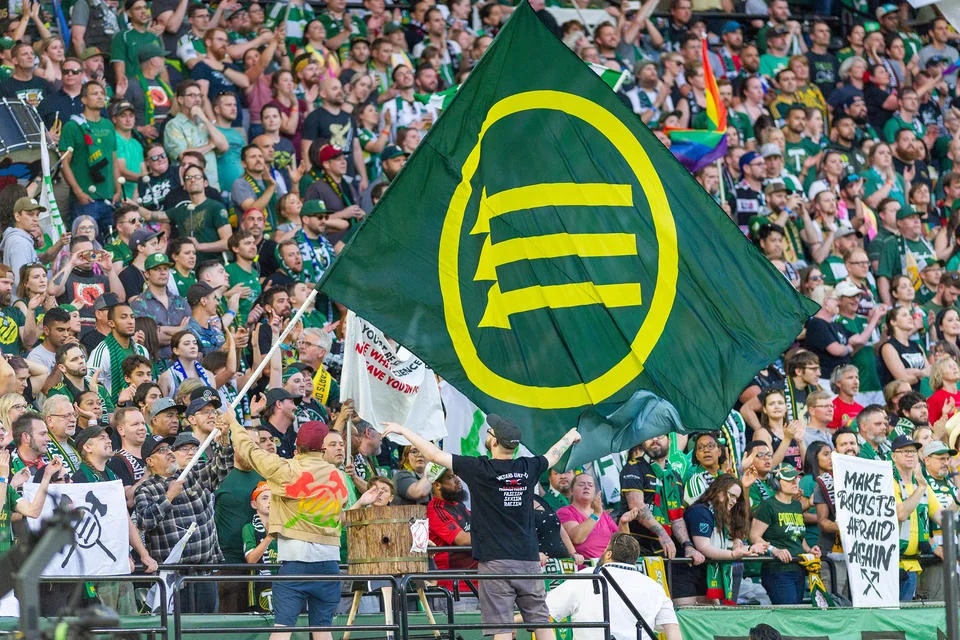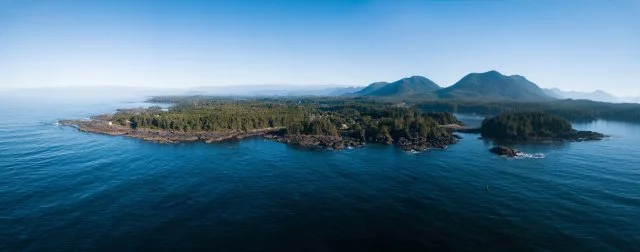With the goal of growing Team Cascadia at home, and a mission to take “The Dougs” global, the Cascadia Association Football Federation has entered a Partnership with the Western Washington Premier League.
Our New Diplomat Departments Forming for 2020
As we enter into 2020, our Cascadian Diplomats are organizing themselves into six different core departments they have deemed to be the highest priority for building the Cascadia movement, the independence of the Cascadia Bioregion, building a network of bioregional movements around the world, and improve the well being and liveability of our bioregion.
Your Chinook Wawa Word of the Day: Alki
ALKI
[AHL-kee] (historical) or [al-KAI] (modern) — adverb.
Meaning: Eventually; someday; in the future; times to come; presently; directly; later; in a little while; after a while; shortly; will; shall;
Origin: Chinook alkekh > From a Chinookan particle álqi 'will be', ‘later on’
The word “alki”, appeared as the slogan on the seal of Washington Territory, and is the current state motto of Washington, and is usually translated as meaning "by and by", "soon", "hold on", and other connections to the future, or even as a way of saying “not so fast”. In ordinary use it is somewhat equivalent to the Mexican Spanish mañana, meaning sometime in the near future, or an indeterminate time away, perhaps never. It can be used as a verb auxiliary indicating the indefinite future tense, ‘shall’ or ‘will’, as seen in "mamook alki" (to delay; to defer), “wawa alki mamook” (postpone), or the expression "alki nika klatawa" (I will go presently), with the days of the week, and the number of weeks, months and years are also used to designate tenses.
The phrase “laly alki” can be used to mean "in a while" or "sometime soon" or another point in the immediate near future, as seen in "alki nesika klatawa kopa nika boat" (soon we will go in my boat) or "alki nika klatawa" (I will go soon) or "tenas alki" (in a little while).
The phrase "Iskum dolla, alki pay" (to borrow; to take out a loan) literally means get money, pay later, an apt expression if there ever was one. If you are struggling to learn something, you could confidently reassure someone by saying "nika kumtuks alki" ( I will understand eventually), while an appropriate closing to a letter would be “alki weght” (soon again).
The Statue of Liberty, or Lady Liberty, is a replica of the Statue of Liberty, installed at Alki Beach Park, in Seattle, Washington. It was installed in 1952 by the Boy Scouts of America and underwent a significant restoration in 2007 after repeated vandalism had damaged the sculpture.
This word is now firmly connected to Alki Point, the beach on the west Seattle peninsula where the city officially began in late 1851. Historical accounts say that entrepreneur Charles Terry wanted to name the tiny settlement New York, and that someone, either a well-wisher or doubter, added Alki to the name, with the connotation of "maybe someday".
Some time during the twentieth century the pronunciation of the second syllable changed from "kee" to "kai", likely during the prohibition era (1920 to 1933) due to the word’s similarity in sound to the slang term for an alcoholic (‘alkie’ or ‘alky’).
New fundraiser for Forests for Climate Resilience this Saturday in Portland, Oregon.
Join Forests for Climate Resilience and Forest Defenders for a gathering of #Forest Folk, Saturday in Portland, Oregon. The night will feature music, forest updates and movement news!
Calls for Justice from Catalonia - Lessons for Cascadia.
Your Chinook Wawa Word of the Day: Tillikum
TILLIKUM
[TIL'-i-kum] or [TIL'-LI-kum] — noun.
Meaning: Person; people; relative; relation; family; kin; kindred; ally; fellow; associate; folk; tribe; nation; population;
Origin: From Chinookan stems -lkh 'ground, earth' + t- 'plural' > Chinook tilikhum ‘people’
Commonly spelled “tillicum”, and sometimes pluralized in the English style as ‘tillikums”, the word means means “person” or “people,” and often has the connotation of a friend or relative, but has also come to signify a friend or ally. It usually means those who are not a “tyee” (chief), but rather common people, and can refer to any people and can be used to signify one’s social group, band, tribe, or even nation.
It can be used to describe one’s "ahnkuttie tillikums" (ancestors; ancient people), “cultus tilikum” (ordinary people; insignificant people; nobodies), or just "konaway tillikum" (everyone; everybody; humankind), be it "nesika tillikums" (our people) or "yaka tillikum" (their people).
“Klahowya tillikum” (hello, people; greetings, my friends/family) is a standard greeting in Chinook Wawa, and serves as a good way to address people you see in your “tillikum mitlite wake siah” (neighborhood), or even say to a "huloima tillikum" (stranger; foreigner; people of a different group) which one might encounter in a large "hiyu tillikum" (a crowd; a gathering; a throng). Of course if you just wanted to get the attention of a person or a group of people, you could simply shout "nah tillikums!" (hark people!).
Regarding other group activities, gathering with a group of friends to celebrate a “ahnkuttie tillikums klaska wawa” (tradition) makes for a good time, as does cheering for the “tillikum yaka tolo” (victor) of a game.
Conversely, people can take soluce by sharing "ahnkuttie tillikums yiem wawa" (tales spoken by the ancient people) during a “mahsh memaloose tillikum kopa memaloose Illahee” (funeral)
Anticipating "hiyu tillikums kopa house" (an audience), one might ask "kunsih tillikum mitlite?" (how many people are there?), and hopefully not hear “wake tilikum” (nobody).
Politicians often pass measures that are either “kloshe kopa hiyu tillikums” (popular) or “konaway tillikums halo ticky kahkwa” (unpopular) with the “kloshe kopa konaway tillikums” (public). Of course, someone with a position like the “tillikum yaka kloshe nanitch dolla” (treasurer) should try to remain “cultus kopa huloima tillikums (independent)
While many uses of the word describe "kahkwa tillikum" (friendly) relations, it is also used for a number of interpersonal conflicts; transients might be labeled “cultus tilikum” (vagabond), and group gathering might be divisively labeled “cultus tillikums” (rabble) or "solleks tillikum" (a mob).
During a war, a “pight tilikum” (warrior) would fight against the “solleks tilikum” (enemy), though sometimes this term would also be used as a substitute for “mesachie tilikum” (rascal; villain; sinner), the most heinous being labeled “hyas mesachie tilikum” (outlaw), who might quickly find themselves “halo tilikum” (friendless) or even a “tillikum kopa skookum house” (prisoner).
Spelled either as tillicum or tillikum, the word is a commonplace name across Cascadia:
A Tillicum Creek can be found near Huckleberry Mountain, Quartz Creek Butte, and Orwig Hump in Washington, as well as Chumstick Mountain and near Huron, Oregon.
Tillicum Beach located near both Yachats, Oregon and Langley, Washington, and a Tillicum Street exists in both Seattle and Vancouver.
There is a Tillicum Elementary School in both Steilacoom, Washington and Victoria, British Columbia, as well as a Tillicum Middle School located in Bellevue, Washington and a Tillicum Junior High School in Issaquah, Washington.
Tillicum station is a planned commuter rail station in Lakewood, Washington, in the historic Tillicum neighborhood, and scheduled to open in 2036 as an extension of the Sounder South Line from Lakewood station via the Point Defiance Bypass. The station would be located in the Tillicum neighborhood, near the intersection of Interstate 5 and Berkeley Street Southwest, adjacent to Joint Base Lewis–McChord.
Tilikum Crossing (also known as Bridge of the People) is a cable-stayed bridge across the Willamette River in Portland, Oregon. It was designed by TriMet, the Portland metropolitan area's regional transit authority, for its MAX Orange Line light rail passenger trains. The bridge also serves city buses and the Portland Streetcar, as well as bicycles, pedestrians, and emergency vehicles. Private cars and trucks are not permitted on the bridge. It is the first major bridge in the U.S. that was designed to allow access to transit vehicles, cyclists, and pedestrians but not cars.
Statue of Chief Seattle overlooking Tilikum Place. Cedar Street is in the background.
Tilikum Place is a small triangular plaza in the Belltown neighborhood of downtown Seattle, Washington which at the intersection of 5th Avenue, Cedar Street, and Denny Way, and features a life-size statue of Chief Seattle by local sculptor James Wehn.
Blake Island is believed to be the birthplace of Chief Si'ahl.
Tillicum Village on Blake Island, accessible from Seattle by ferry, is a famous visitor attraction that offers a Cascadian First Nation’s equivalent of a luau, complete with a stage show, for the hungry tourist. Bill Hewitt, a local restaurant owner, founded Tillicum Village in 1962, the year of the Seattle World's Fair. The Hewitt family operated it until selling it to Argosy Cruises, the operator of the Tillicum Excursion, in 2009. For 18 years, the show was Dance on the Wind, focusing on dances of the First Nations of British Columbia, provided by Thompson's, a locally based theatrical production company.
Tillicum Centre is a large shopping mall along Tillicum Road in Victoria, British Columbia.
The MV Tillikum, the sole remaining Evergreen State-class ferry operated by Washington State Ferries which since the retirement of her sister Klahowya in 2017, she has been serving primarily as the San Juan Inter-island vessel.
The CFAV Tillicum (YTM 555) is a 140-ton harbour tug of the Queen`s Harbour Master, stationed at CFB Esquimalt, on Vancouver Island.
The 1971 single "Tillicum", is a song performed by Canadian electronic music group Syrinx.
Tilikum (1981-2017), was a bull orca, enslaved by SeaWorld Orlando, that had been involved in the deaths of three of the park personnel.
Trillium ovatum var. Tillicum, is a variant of T. ovatum, a small flowering plant native to Cascadia.
2020 Cascadia Grains Conference scheduled for January 18 & 19 in Olympia, Washington
Coming Home: A New Map Telling a New Story of this Place
Your Chinook Wawa Word of the Day: Tyee
TYEE
[ty-EE' ] or [tahy-EE] — Noun, Adjective.
Origin: From Nootka Jargon tayi(s) < Nuu-chah-nulth tayi "elder", “oldest son”, "older brother", "senior"; allegedly resembles Inuktitut toyom "chief"
Meaning: boss; chief; foreman; gentleman; governor; an important person; landlord; leader; magistrate; manager; master; officer; a superior; any thing of superior order
Occasionally spelled ‘tyhee’ in some place names, and as ‘tayi’ in older publications, ‘tyee’ is one of the most commonly used and wide-spread words in Chinook Wawa. Originally used to only describe a chief or to differentiate nobility from the common people (tillikum), it would later be applied to any anyone or anything in a leadership position or other wise acts "kahkwa tyee" (kingly, like a king), as seen in “tyee lamel” (boss mule), “tyee kopa town” (mayor), "Tyee kopa Washington" (President of the United States), or “tyee klootchman” (matron; queen). The title of “Sagalie Tyee” is usually translated as "Great Spirit" or "God" but literally means "chief above".
The word ‘tyee’ can also extend to places, such as “tyee town” (metropolis), positions like “tyee kopa pepah house” (postmaster) or “tyee kopa court” (judge), institutions like “tyee man klaska mamook law” (legislature), or actions like “mamook tyee” (govern) and “pight kopa tyee” (rebel; rebellion).
The title of “hyas tyee” (Great Chief; King; General) was traditionally used by Maquinna and Wickanninish, the two principal chiefs of the Nuu-chah-nulth First Nation at the time explorers Vancouver and Bodega y Quadra made contact. This was also the title of the famous chiefs Khatsahlahno (of the Squamish) and Cumshewa (of the Haida), etc. and also of the British king or local governor. In later years, it could also mean a high company or government official or chief military officer. Today the title of “hyas tyee” could be applied to a senator, a longtime MP or MLA, or a business magnate with a strong local powerbase, long-time connections, and wealth from and because of the area.
The title “Hyas Klootchman Tyee” (Great Woman Ruler) translates roughly to "Her Majesty", and was used to refer to Queen Victoria in public proclamations during her reign. In theory, this title also applies to Queen Elizabeth II but it is no longer used by the BC government.
Occasionally it could be used as an adjective, as seen in "kahkwa tyee" (kingly; like a king), or "tyee salmon" (king salmon), a term still used today in the Campbell River-Johnstone Strait region to refer to a large spring Chinook salmon of extraordinary size, usually anything weighing more than 13.5 kg (29.76 lbs).
Tyee is an extremely common name for places and businesses, with the spelling Tyhee occasionally showing up in Idaho and some parts of British Columbia. Tyee Drive is located on Point Roberts, while there is a Tyee Court in Vancouver, BC and a Tyee Road in Victoria, BC. Tyhee Elementary School is located in Bannock, ID, while Tyee Middle School and Tyee High School are located in Washington. The Tyee Restaurant and Motel, established in 1926, is located in Coupeville, WA, while Oregon has Tyee Camp, along with Tyee Wine Cellars and Tyee Lodge, just to name a few.
There is a popular BC news site named The Tyee, and beginning in 1900, Tyee was also the title of the University of Washington Yearbook.
Your Chinook Wawa Word of the Day: Cosho
COSHO
[ko'-SHO] or [KU'-shu] — noun.
Meaning: Hog; pig; swine; pork; ham; bacon.
Origin: French, le cochon, ‘pig’
“Oink, oink indeed,” said the Harbor Seal.
Sometimes rendered as gosho, legosho, or lecosho in older sources, “cosho” (with the accent on the second syllable) was a French loanword used to mean pig or swine, but by context can be said to refer to the meat of the animal, though if one wanted to specify they could say "cosho itlwillie" (hog meat; pork).
Variants included "klootchman cosho" (sow pig), “tenas cosho” (piglet), and "cosho glease" (lard) as well as “wawa kahkwa cosho” (squeal), covering the famous line of the Hog Industry, “konaway ikta pe wawa kahkwa cosho” (everything but the squeal).
The word is also used in “siwash cosho” (aboriginal pig) used to refer to the meat of a seal, being somewhat similar in appearance, if not in taste, to that of swine, and was as much a staple of coastal First Nation life as pork was to the British or the Americans. It's worth noting that this expression was purely a jargon creation, and an equally prevalent word used throughout the region was “olehiyu” (seal), which was of Chinookan origin.
First Annual Cascadia Food Festival - Saturday October 5th in Vancouver, Washington
Taste the Region and Explore Food Connections at the Food and Cider Festival, Slow Food Summit, and Cascadian Luau during this all day event brought to you by Slow Food Cascadia. Join us as we build a just, craft, regenerative food movement in the Cascadia region, and raise funds to support farm-to-food bank program.
Cascadia Center for Leadership opens 2020 Application Cycle
THOSE WHO PRESERVE THE PAST, AND THOSE WHO DESTROY THE FUTURE: The Tragedy of the Southern Oregon Historical Society
Your Chinook Wawa Word of the Day: Delate
DELATE
[de-LATEY'] or [de-LEYT'] — adjective, adverb.
Meaning: accurate; authentic; certain; correct; correctly; direct; exact; definite; definitley; genuine; just; straight; plain; precise; real; really; sincere; sincerely; sure; thorough; true; truely; upright; undoubted; verily; very; without equivocation; without hesitation.
Origin: Either a corruption of English, straight; or Norman French drette > standard French droite ‘right’, both the directional and legal senses.
In Chinook Wawa, ‘delate’ is used as a superlative, which when added makes a statement positive and removes any element of doubt. Phrases like "delate nika wawa" (I am speaking the truth), "delate siah" (a very great distance), or "delate kwinnum cole ahnkuttie" (exactly five years ago) illustrate that anything ‘delate’ is the genuine article.
‘Delate’ can emphasize the quality of something, as in "delate kloshe" (very good; exquisite; pure; perfect) and "delate kahkwa” (exactly the same; identical), "delate chee" (entirely new), or “delate kimtah” (the last).
It serves as an affirmative, such as in “delate klosheh” (very good; right on), "okoke delate" (that is right; it is correct), “nawitka, delate kloshe” (yes, perfect), and "delate hyas kloshe" (majestic; magnificent; awe-inspiring).
Alternatively, it can emphasize a negative, such as “delate cultus” (absolute worthlessness; useless; mean), “wake delate" (not right; imperfect; deformed), "delate halo ticky" (to detest; dislike), “delate hyas mesachie” (terrible; terror), or if something is "delate kimtah kloshe" (very worse; worst), or declare that something or someone is being at “wake delate mamook” (fault) of something.
It can be used in the directional sense, such as "klatawa delate" (to go straight ahead; continue on), when describing size, as seen in "delate hyas" (enormous; immense; stupendous), emphasizes an exact time, such as "delate tenas sun" (dawn; daybreak), and of course all-important baking instructions, ranging from “delate tenas" (just a little) to "delate pahtl" (full to the brim; chockfull).
It can be used to express genuine feelings, such as "delate sick tumtum" (grief; very sad; very sorry) and the expression "delate nika sick tumtum" (I am very sorry), or tell someone that something is “delate ticky” (really necessary) or state if one has "halo delate kumtuks" (doubt, uncertain; obscure).
If you “mitlite delate kloshe tumtum kopa” (adore) something, you might describe it as being “delate hyas kloshe” (magnificent; majestic; awe-inspiring; very good) and that "nika tumtum delate kloshe" (my heart is very glad).
If a process results in "halo delate mamook" (not right work), one needs to "mamook delate" (to make right; correct) and “mamook delate kloshe (refine) the process in order for it to “delate kumtuks” (prove) useful.
If one is "delate yaka kumtuks" (an expert) and can "delate kumtuks" (know for a certainty; to be sure; to prove), then it is easy to "wawa delate" (speak the truth; speak correctly; affirm), especially if one is a “man yaka delate nanitch” (eyewitness) to something.
A skilled “man yaka delate kumtux potlatch wawa” (orator) will not likely “halo delate wawa” (mispronounce) words when speaking, though it will be up to the listener to determine if what they say is "delate wawa" (fact; promise; direct talk; straight truth) or “wake delate wawa” (legend; fiction; fable).
Just like the French word it is based on, ‘delate’ applies to both the legal sense, as in "delate yaka illahee" (a native of a country; one's native land), and in the physical sense, with a Delate Creek existing in Washington, Oregon, and Idaho each.
This Delate Road is located just outside of Poulsbo, Washington, across from Seattle on the Olympic Peninsula. There are many roads and streets with Chinook Wawa names in Cascadia.
MLS withdraws prohibition of Anti-Fascist "Iron Front" Symbol in Victory for Cascadia Supporter Groups
In a victory for the Cascadia Major League Soccer supporter groups, the Major League Soccer federation has rescinded a prohibition on the use of the anti-fascist Iron Front symbol as they work with fans to rewrite their code of conduct. The symbol was recently banned, with the league trying to claim that it violated it’s code of conduct because it was a ‘political statement’. Supporter groups have countered that being pro-human rights, as well as being tolerant and inclusive of all individuals, regardless of their race, religion or skin color, is hardly political.
New open source 'Cascadia Code' released for Windows Terminal
Your Chinook Wawa Word of the Day: Hyak
HYAK
[HY'-ak] — adverb.
Meaning: Swift; fast; quick; quickly; speed; speedy; hurry; hasten; make haste; instantly; prompt; sudden; suddenly; rapid; rapidity of motion.
Origin: Chinook ai-ak, from a Chinookan particle áyaq 'can; quick, quickly'
Used to denote speed or urgency, as seen in “hyak kilapi” (return quickly; hurry back), "mamook hyak" (to make haste; to be prompt; expedite), and “hyak cooley” (run; race; to run rapidly or go fast), or other forms of rapid movement, like “hyak klatawa” (dodge; gallop). If you ordered a delivery expedited, you might be surprised by the delivery person and how "hyak yaka chako" (quickly they come), perhaps even saying "kloshe mika hyak chako" (good you come quickly) if it was an urgent delivery.
‘Hyak’ could be used to denote frequency, as seen in “hyak hyak” (so often), or even be used as an imperative simply meaning “Hurry!” or “Hurry up!”. Of course, the opposite would be "wake hyak" (moderate; slow; not fast).
Iron Horse Trailstop in Hyak, WA
Hyak lends itself to numerous place names across Cascadia; Hyak County Park is located near Albany, Oregon while Hyak Junior High School is located in Bellevue, Washington. There are two separate Hyak Creeks in Washington, one of which feeds into Hyak Lake, which lies near the unincorporated community of Hyak, Washington, which was established around 1915 at the eastern portal of the Snoqualmie Pass Milwaukee Road Railroad tunnel. Originally a train station, the community began to grow in the 1930s when the railroad built a world-class ski area.
Hyak Mountain is located in the Purcell Mountain range near the communities of Argenta and Lardeau in British Columbia, while Hyak Shelter, a rectangular, 1-story historical building of peeled-pole wall construction, with a wood-shaked, modified gable roof and set on a stone foundation, is located at the edge of an open field, along the North Fork Bogachiel River Trail, within Olympic National Park.
The word is also used for the name of the Hyack Festival held on Victoria Day weekend in New Westminster, BC, distinguished by the Ancient and Honourable Hyack Anvil Battery Salute, a tradition created by The New Westminster Fire Department — known as “The Hyacks" — in 1870 as a surrogate for the royal 21-gun salute usually performed on the Queen's Birthday. With no cannons available in the early colony, the Fire Department improvised by placing gunpowder between two anvils, the top one upturned, and igniting the charge from a safe distance, hurling the upper anvil into the air.
This celebration continues today as an important civic tradition, lending the city the distinction of having the longest-running May Day celebration of its type in the British Commonwealth. Within B.C., at least four other communities still celebrate May Day: Port Coquitlam, Ladner in Delta (whose May Day Festival began in 1896), Bradner in Abbotsford, and The Sunshine Coast's Pender Harbour.
There did exist an interesting regional variant of Chinook Wawa; in the Fraser Canyon "holaporte" was heard to mean "hurry!"
It comes from "all aboard", a cry uttered from many of the steamboats which piloted the Fraser River in the 19th and early 20th centuries.
As an interesting coincidence, the modern Japanese verb and adverb 早く “hayaku” (fast; quickly; hasten) bears a notable similarity to the Chinook Wawa word.
Your Chinook Wawa Word of the Day: Chuck
CHUCK
[chuhk] or [tsukw] — noun.
Meaning: water; liquid; river; stream
Origin: Nootka Jargon chaak 'water' < Nuu-chah-nulth cha’uk ‘water’. Also from a Chinookan noun tlchuqw ‘water’ > Chinook, tltsuk; Clatsop, tl'chukw, freshwater. Evidently, a case of accidentally converging form/meaning.
The word ‘chuck’ is extremely widespread in Chinook Wawa. While it can often be used as a shorthand of any number of bodies of water, there are often modifiers to lessen the ambiguity; "cooley chuck" (river; stream), “tenas chuck” (creek; brook; pool; moisture), “memaloose chuck” (pond), “hiyu chuck” (flood), and "hyas chuck" (deluge) are just some of them. Perhaps the most widely used variant was "skookum chuck" (whitewater rapids), a compound word literally meaning "strong water" that is found in many place names throughout Cascadia.
In addition to bodies of water, is also included activities and actions in those bodies, such as “mitlite saghalie kopa chuck” (float), “mahsh keekwullie kopa chuck” (submerge), “klatawa keekwullie kopa chuck” (dive) and “chako klahanie kopa chuck” (come out of the water). Of course, it could be risky to “klatawa kopa lepee kopa chuck” (wade) or "chuck ooahut" (to ford) out into "klip chuck" (deep water) for one might "memaloose kopa chuck” (drown) if unprepared.
The word ‘chuck’ is also used to refer to any type of “kahkwa chuck” (fluid; liquid), such as “chuck kopa stick” (sap) and “klale chuck kopa mamook tzum” (ink), "saghalie chuck" (holy water; magical potion; hot spring), and "cultus chuck" (alkali water; poison).
It lends itself to the names of some drinks, like “olallie chuck” (juice; berry juice), "chuck lapome" (cider), "piah chuck" (whisky), and that famous concoction "lumpechuck" (grog), a mixture of rum and water better known in the Queen's Navy as "diluted spirits."
It also applies to some bodily fluids, such as "chuck kopa seeowist" (tears), “chuck kopa skin” (sweat), “chuck mitlite kopa skin” (perspiration), and “mahsh lapush chuck” (spit; saliva").
There was also "salt chuck" (saltwater; the sea) and “hyas salt chuck” (ocean), places where one finds "salt chuck tupso" (seaweed) and maybe the occasional “chuck ooahut” (waterspout) during "solleks chuck" (a rough sea). Waves were normally expressed as “chuck chako solleks”, but could also be called “hiyu sea” in some cases.
The word ‘chuck’ is also used as part of a number of related marine descriptors, such as “illahee wake siah kopa chuck” (coast; coastline) and used to describe the different types of "chuck chako pe klatawa" (tide), including “chuck chako” (incoming tide; rising tide), “chuck kilapi” (outgoing tide; falling tide), "saghalie chuck" (high tide), "keekwullie chuck" (low tide), and “chuck yaka klatawa” (ebb tide).
These are all things one must be aware of when they “klatawa kopa chuck” (navigate), for one doesn’t want to be “cultus mitlite kopa chuck” (adrift) in a storm, and one most definitely dosn’t want to have to "mahsh chuck kopa boat" (bail out the boat).
Word order is important in Chinook Wawa, since “chuck mitlite kopa illahee (muddy ground) is a bit different from “illahee mitlite kopa chuck” (muddy water). Similarly, additional context can alter the meaning of a saying, as seen in the difference between "mitlite kopa chuck" (soak; to be wet) has a different meaning from "yaka mitlite kopa chuck” (they are on the water).
This also extends to phrases involving water; "mamook wagh chuck" (pour some water) is a bit different from “mamook cooley chuck” (irrigate) and “mamook liplip chuck” (boil water), and all three have a substantially different meaning from “mahsh chuck” (urinate).
Cascadia Seaweed & Nuu-chah-nulth Partnership Transforming Plant Based Food Industry
The Cascadia Seaweed Corporation and First Nation owned Nuu-cha-nulth Seafood are revolutionizing the plant based food industry by becoming the worlds largest kelp & seaweed based farming & harvesting company.
Your Chinook Wawa Word of the Day: Tenas
TENAS
[TEN'-as] — adjective. [ten'-AS] or [dun'-US] (Grand Ronde pronunciation) — noun.
Meaning: Small; few; little; lesser; weak; young; a child; a youth
Origin: From Nootka Jargon taná(s) 'child, little' < Nuu-chah-nulth t’an’ais ‘child’
The opposite of ‘skookum’, ‘hyas’, and ‘hiyu’ in differing contexts. In the Lower Columbia and Grand Ronde Chinuk-Wawa, the distinction between ten'-as and dun'-us (not GR spellings, just approximations of pronunciations) is between ‘small/little’ and ‘child/young’.
Photo by Martha Boers.
In some usages, “tenas” means ‘child’, as in “mokst nika tenas” (I have two children) and is used to describe youths as either “klootchman tenas” (girl; young woman) or “tenas man” (boy; young man), but these terms could be used in some cases to mean ‘daughter’ and ‘son’ respectively. These titles were also extended to describe a "tenas yaka tenas" (grandchild), like a “tenas yaka tenas klootchman" (granddaughter) or a “tenas yaka tenas man” (grandson). It was also extend to mean the young of any living creature, such as “tenas puss-puss” (kitten).
The word can be used to describe the "hyas tenas" (very small) version of something, as evident in "tenas house" (hut), “tenas labal” (bullet) and “tenas lop” (string; cord), or can denote quantity, as in “tenas hyiu” (a few), "tenas weght" (a little more), or “tenas sitkum” (small half) which is used to describe a quarter or 25% of something. Man, those tickets were amazingly "tenas mahkook" (cheap; inexpensive)! You could say that the discount really caused the price to “chako tenas" (decrease; diminish), though the expresion "mamook tenas" was another way of expressing the same idea.
Geographic features such as a “tenaschuck” (lake; pond) or a “tenas saghalie illahee” (hill), seasons like “tenas waum (spring) and “tenas cole” (autumn), times of day such as “tenas sun” (early; early morning) or “tenas polaklie” (evening), or recent events, like “tenas ahnkuttie” (recently; a little while ago), and “tenas laly kimta” (a little while after).
While pushing a "chik-chik kopa tenas" (baby stroller) through the park, one might engaging in “tenas wawa” (small talk) by discussing weather conditions like a pleasant “tenas wind” (breeze; light wind) or mentioning that "tenas snow chako" (a little snow has come). However, if someone you encounter is “tenas sick” (hung over) they are not likely to be very sociable.
Like many words in Chinook Wawa, ‘tenas’ is a very popular place name, with no fewer than 30 locations featuring it as part of their name, chief among these are Tenas Lake (three located in British Columbia, one in Washington, one in Oregon, and one in Alaska) and Tenas Creek (three located in Washington, two in British Columbia, one in Idaho, and one in Alaska).



